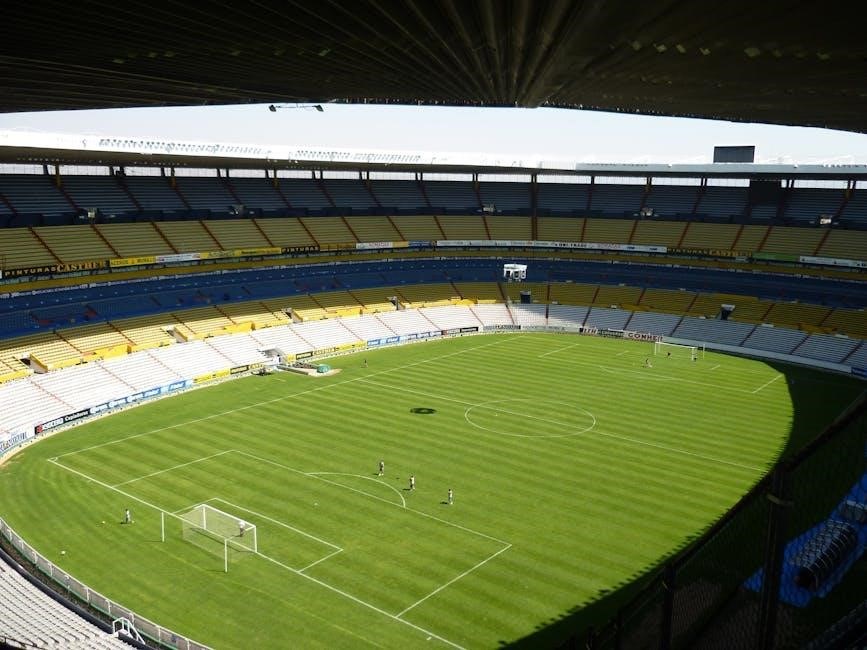The origins of Olympic football trace back to the 1896 Athens Games, where it debuted as a demonstration sport. Great Britain secured the first gold medal in 1900, marking the sport’s official inclusion. Mexico made its Olympic football debut in 1928, while FIFA’s involvement from 1924 onwards shaped the tournament’s evolution, integrating it into the global football landscape.
1.1 The Origins and Significance of Football in the Olympics
Football first appeared at the 1896 Athens Olympics as a demonstration sport, with its official inclusion in 1900. Great Britain won the first gold medal, establishing the sport’s Olympic presence. Over time, football gained global recognition, with Mexico making its debut in 1928. FIFA’s involvement from 1924 onwards played a crucial role in shaping the tournament, integrating it into the global football landscape. The sport’s inclusion reflected its massive popularity worldwide, making it a cornerstone of the Olympics. Its significance lies in its ability to unite cultures and nations, showcasing football’s universal appeal and enduring legacy in the Olympic Games.
1.2 The First Olympic Football Tournament (1896)
The 1896 Athens Olympics featured football as a demonstration sport, with a single match involving 15-20 players from local clubs. Organized by the Panhellenic Athletic Club, it was not an official competition but marked football’s Olympic debut. The event highlighted the sport’s growing international appeal, despite its unofficial status. This initial tournament laid the groundwork for football’s inclusion in future Olympics, showcasing its potential as a global spectacle. Although not widely recognized as an official event, the 1896 match remains a pivotal moment in the history of Olympic football, symbolizing the sport’s early integration into the Games.
Early Years of Olympic Football (1900-1928)
The early years of Olympic football (1900-1928) saw the sport’s rise, with Great Britain winning the first official gold in 1900. Mexico debuted in 1928, marking football’s growing global influence and solidifying its place in the Olympics.

2.1 The First Official Olympic Football Competition (1900)
The 1900 Paris Olympics hosted the first official Olympic football competition, organized as part of the World’s Fair. Initially, three teams—France, Belgium, and Great Britain—participated in a round-robin format. The British team, representing the Upton Park Football Club, emerged victorious, securing the gold medal. This event marked football’s formal inclusion in the Olympic Games, despite its early challenges, such as limited international participation and varying rules. The 1900 tournament laid the foundation for football’s growth within the Olympics, showcasing its potential as a global sport. Its success paved the way for future competitions, solidifying football’s place in the Olympic program.
2.2 The Rise of Football as an Olympic Sport
Football’s popularity as an Olympic sport grew steadily in the early 20th century. By 1908, the tournament had expanded to include more teams, showcasing its global appeal. The 1920 Antwerp Olympics saw increased participation, with 14 nations competing, marking a turning point in the sport’s Olympic journey. FIFA’s formal involvement from 1924 onwards helped standardize rules and structure, enhancing the competition’s credibility. The 1928 Amsterdam Olympics further solidified football’s status, with a record 17 teams participating. This period laid the groundwork for football’s enduring presence in the Olympics, transitioning from an amateur-focused event to a platform for emerging talents and national pride.

The Evolution of Olympic Football (1928-1960)
The 1928 Amsterdam Olympics marked a pivotal era for Olympic football, as FIFA’s involvement led to the introduction of the World Cup in 1930, reshaping the sport’s global landscape.

The Evolution of Olympic Football (1928-1960)

3.1 The Impact of the 1928 Amsterdam Olympics
The 1928 Amsterdam Olympics marked a significant turning point for Olympic football, as it was the first time the sport gained widespread international recognition. The tournament featured teams from Europe and South America, with Uruguay winning the gold medal. This event highlighted the growing global appeal of football, leading to the establishment of the FIFA World Cup in 1930. The success of the 1928 Olympics demonstrated the potential of football as a unifying force in sports, setting the stage for its evolution into a cornerstone of both the Olympic Games and global football culture. This period laid the foundation for the sport’s future growth and international competitions.
3.2 Mexico’s Debut and Early Success in Olympic Football
Mexico made its Olympic football debut at the 1928 Amsterdam Games, marking a significant milestone in its sporting history. Competing in Group A alongside the host nation, the Netherlands, Mexico’s participation highlighted the growing global interest in the sport. Although the team faced challenges, their involvement underscored the country’s commitment to football and its desire to compete on the international stage. This debut set the stage for Mexico’s future endeavors in Olympic football, showcasing the nation’s passion for the sport and its determination to leave a lasting legacy in global football competitions.

Modern Era of Olympic Football (1960-2000)

The modern era saw Olympic football evolve with the introduction of professional players, enhancing competition quality. The 1996 Atlanta Olympics became a landmark, showcasing football’s global appeal and setting the stage for future growth.

The introduction of professional players in Olympic football marked a significant shift in the sport’s evolution. Prior to this era, the tournament was largely limited to amateur athletes, but the modernization of sports policies led to the inclusion of professionals. This change, facilitated by FIFA and the International Olympic Committee, aimed to elevate the competition’s standards and attract a broader audience. The 1996 Atlanta Olympics exemplified this transformation, featuring top-tier players and showcasing football’s global appeal. This period also saw increased media coverage and commercialization, further integrating Olympic football into the global sports landscape.
4.2 The Legacy of the 1996 Atlanta Olympics
The 1996 Atlanta Olympics marked a pivotal moment in Olympic football history, showcasing the sport’s growing global appeal. This tournament was the first to feature professional players extensively, drawing massive audiences and setting record attendance. The women’s football debut in Atlanta further expanded the sport’s inclusivity, paving the way for future generations. The event’s success highlighted the commercial potential of Olympic football, with ticket prices soaring, especially for high-demand matches. The legacy of the 1996 Olympics lies in its ability to merge elite competition with broad accessibility, cementing football’s status as a cornerstone of the Games and inspiring future innovations in the sport’s Olympic format.
Contemporary Olympic Football (2000-Present)
Contemporary Olympic football has seen rising global interest, with Mexico’s 2012 gold marking a historic milestone. The sport continues to evolve, blending tradition with modern competition formats.

5.1 The 2012 London Olympics and Mexico’s Historic Gold
The 2012 London Olympics marked a pivotal moment in Olympic football history, as Mexico captured its first-ever gold medal in the sport. Led by coach Luis Fernando Tena, the Mexican team showcased exceptional skill and determination throughout the tournament. In the final, Mexico defeated Brazil 2-1 at Wembley Stadium, with Oribe Peralta scoring the decisive goals; This victory not only made Mexico the first team from outside Europe and South America to win Olympic gold but also cemented its place in football history. The success of the 2012 team inspired a new generation of Mexican players and fans, solidifying football’s enduring legacy in the Olympics.
5.2 The Future of Olympic Football and Its Global Appeal
Olympic football continues to evolve, captivating audiences worldwide with its unique blend of youth talent and international competition. The tournament’s global appeal is evident in its ability to unite fans across cultures, making it a cornerstone of the Olympics. Future editions, such as the 2024 Paris Games, aim to build on this legacy, with plans to expand participation and enhance spectator experiences. The introduction of new formats and technologies promises to further elevate the sport’s visibility. As football remains a driving force in the Olympics, its enduring popularity ensures that it will remain a central part of the Games for years to come.